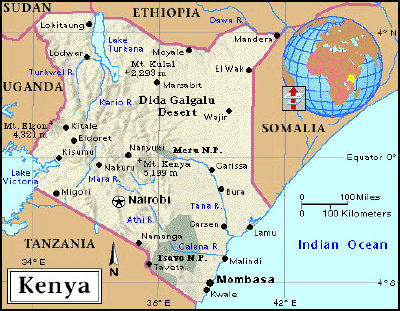Kenya AA “Karindundu Estate”

Equatorial Kebab
On the map, the Equator skewers Kenya like a tasty bit of shish kebab. This maximal solar exposure is modulated by monsoons and Indian Ocean tradewinds. The Great Rift Valley, which runs from Syria to South Africa dominates Kenya’s inland relief, giving its coffee trees the cooling and slow growth benefits of high altitude, free of frost.
Coffee is grown north and northeast of Nairobi, on the high plateaus surrounding Mt. Kenya (5,195 meters), and in the Aberdare zones at altitudes of from 1,500 to 2,100 meters (5,000 to 7,000 feet). Introduced before the turn of the century, coffee is today grown on 350,000 mostly small family farms (average size two acres); representing a third of Kenya’s export earnings and one-half of its total agricultural production.
For millions of Swahili and English-speaking Bantus of Kenya, coffee culture is a way of life. Independent since 1963, Kenyans were among the first to focus all their efforts towards producing high quality coffee, to obtain one of the highest prices on the world market. Cultivation is 99% arabica. Sophisticated cultural practices such as mowing, pruning, mulching and irrigation have been practiced for generations. Quality-conscious workers pick fully ripe cherries in seven pickings spread over the October-December harvest. The cherries are processed by the “wet” method, sun dried, and painstakingly sorted by hand.
 Expansion of areas under coffee is limited by the powerful Kenya Coffee Board, which also conducts the weekly auctions at which all of the nations’ coffee is sold. These auctions have become an arena of fierce competition between the world’s conoisseurs. Prices for the choicest coffees in the auction run as high as three times the price of green Colombian or Guatemalan. This year prices have broken all previous records.
Expansion of areas under coffee is limited by the powerful Kenya Coffee Board, which also conducts the weekly auctions at which all of the nations’ coffee is sold. These auctions have become an arena of fierce competition between the world’s conoisseurs. Prices for the choicest coffees in the auction run as high as three times the price of green Colombian or Guatemalan. This year prices have broken all previous records.
Our supplier, a much-traveled expert on Kenya coffees, receives and “cups” the samples, submits bids via her licensed agent in Nairobi, and waits expectantly to hear whether her offer has prevailed. Karindundu Estate was her first choice of the coffees offered at auction this Spring, so she was determined not to be outbid.
The taste of Karindundu plays a brilliant duet of lively acidity and deep, earthy flavors. They compliment each other like the counterpoint of an exhuberant melody, or if you will, the syncopated incantations of a vibrant African chorus.
Some describe the bright tone of Kenya as “wildness”, or more prosaically, a wine-like dryness. Within its medium body the natural elements of climate and soil have left their indelible mark. One sip reveals the untamed power and complexity of Karindundu.
The Coffee Works is proud to offer a limited quantity of this choice coffee, both to be enjoyed for what it is, and as a reference standard against which to compare all fine coffees.


